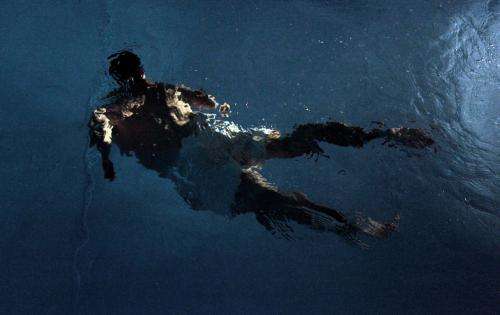The men in the study stood in a tank and were immersed in warm water up to their heart level. Credit: Barbara Fonseca
Water immersion has the potential to provide more benefits than previously thought, according to researchers who have found it increases blood flow in the brain.
UWA School of Sport Science's Howard Carter says the study raises the possibility that increases in blood flow through the brain's cerebral arteries may improve not only vascular health, but also cognitive function.
"Studies on the positive effect of exercise on heart health have been numerous, but we are taking a different angle and are interested in the link between heart and brain health," Mr Carter says.
"To our knowledge, ours is the first examination of the effect of graded euthermic [warm] water immersion on cerebral blood flow."
"We found that brain blood flow is higher when subjects were immersed in water up to the level of the heart compared to on land—laying the ground work for further investigation of its effects on cerebrovascular health."
Results from the study showed blood flow to the middle cerebral artery increased by 14 per cent and posterior cerebral artery increased by nine per cent when subjects were immersed in water.
Subjects were nine healthy males who were positioned in a tank in a standing position and asked to remain as still as possible.
After a 10 minute period of rest, three submersible water pumps filled the tank at a constant rate with euthermic water (30 degrees Celsius) to the level of the heart's right atrium.
Researchers measured cerebral blood flow velocity by using a Transcranial Doppler machine, which uses ultrasound to record the velocity of blood travelling through the cerebral arteries.
Changes in arterial carbon dioxide and blood pressure were also measured to identify causal mechanisms for any changes in brain blood flow.
Mr Carter says the findings of this research highlight the potential benefits of aquatic-based activities.
"As with land-based exercise, different types of water-based activities, such as water aerobics and swimming, have slightly different effects on heart function and cerebral blood flow so each would require further investigation," Mr Carter says.
Researchers have now embarked on a six month exercise training study to investigate whether exercise training in water might lead to consistently greater increases in cerebral blood flow compared to exercise on land, and whether this may lead to greater improvements in vascular health and cognitive function.
More information: "Cardiovascular responses to water immersion in humans: Impact on cerebral perfusion." Carter HH, Spence AL, Pugh CJ, Ainslie PN, Naylor LH, Green DJ. Am J Physiol Regul Integr Comp Physiol. 2014 Feb 19. [Epub ahead of print]
Provided by Science Network WA


















